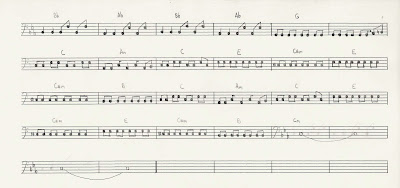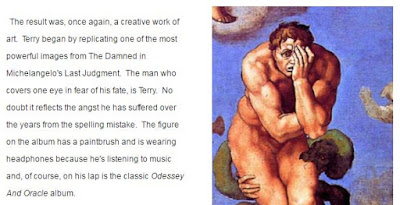[link to original on tumblr]
---&---
I happened to hear the Association's "Along Comes Mary" on the radio this evening, and it reminded me that - hey! - the Association is a band I like (although I have only one album and it's the compilation The Association's Greatest Hits!). Later I tried figuring out some parts to "Everything That Touches You," which is one of my favorites by them, but I didn't have any luck on it. But then I tried "Never My Love," and I ended up getting all of the chords (although I'm sure not all of them are actually played in the song; some are implied or something like that).
And that's relevant for this project because Colin Blunstone recorded a cover of "Never My Love" under his Neil MacArthur pseudonym (although - honestly - I prefer the Association's original; the opening string part in the Neil MacArthur version strikes me as over-dramatic). As far as I can tell, he uses the same chords as the Association, but his version is a half-step higher, which I'm grateful for. The Association's version is in Db major, which is one of the most difficult keys (because it has five flats); a half-step higher is D major, which is much simpler (because it has only two sharps).
I noticed that going into the bridge ("How can you think love will end…"), there's a modulation from I to III, which is unusual (there's a accidental in that second chord that makes it major instead of minor). However, that same change is also in "Friends of Mine." ("Butcher's Tale" has a III to V modulation, and because "Butcher's Tale" is in a minor key, I think that's comparable, although I'm out of my depth here.)
Anyway, now that I know the chords, it should be easier to figure out some other parts.I spent some more time verifying these as I wrote them down, and I discovered that I was missing two chords, one of which is sort of significant with regard to the I to III modulation I made so much about above. I'd thought it was just Db major to F major (or D major to F# major in the Neil MacArthur version), but there's actually an Fsus4 (or F#sus4) in between there. In the Neil MacArthur version, those middle notes (B to A#) are actually sung in the backing vocals as "ah"s.
So, it's still something like I to III, but there's that interstitial chord there (that I don't know how to simplify into the Roman numeral convention).









